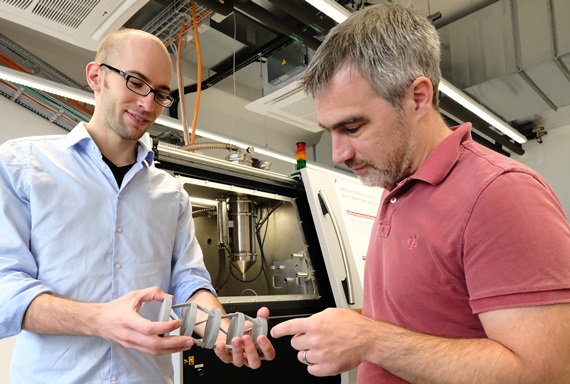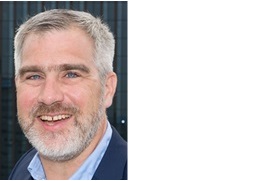Additive Manufacturing

The research activities at Empa are focusing on the materials science aspects in the additive manufacture of metals, ceramics and polymers at different length scales (nm-cm).
At Empa, equipment for the freeform fabrication of
- Metals (selective laser melting, laser metal deposition),
- Polymers (stereo lithography, direct ink writing) and
- Ceramics (fused deposition modeling, lithography-based ceramic manufacturing)
is already available or will be installed in the near future.
New materials for and by Additive Manufacturing
Freeform manufacturing technologies offer a unique ability to dynamically mix materials during the deposition process and produce functionally graded structures, new composite microstructures and perhaps even new material classes. However, energy beam-based processes like selective laser melting imply a very rapid material consolidation, leading to non-equilibrium microstructures, which are usually harder, less ductile, and often exhibit high residual stresses. Therefore, a deep understanding of the correlation between process, microstructure and material properties is required for a successful exploitation of these advantages. In addition, the optimization of existing materials for their successful use in freeform fabrication processes will be important.
The following topics will be addressed:
- Design and characterization of novel alloys for beam-based freeform fabrication processes (e.g. CCMX Challenge AM3)
- Development and characterization of hierarchically structured composites (polymers, metals, ceramics) and multi-materials by using freeform fabrication processes
- Development and characterization of complex 3D structures from metals, ceramics or polymers with new functionalities – e.g. acoustic meta-materials
Powder processing and functionalization
Many freeform fabrication processes are powder-based layer-by-layer methods. However, the minimum feature size is limited by the powder grain size, which is currently >10 µm. Powders with smaller grain size cannot be reliably processed yet because of their tendency to form agglomerates.
At Empa, the following research topics will be addressed:
- Spheroidization and modification of micron-sized powders
- Transport of flowable and unflowable powders for micro-LMD
- Powder recycling
in-situ monitoring and modeling of beam-based freeform fabrication processes
An improved control of beam-based manufacturing processes requires a better understanding of the interaction between the laser or electron beam and the different materials of interest as well as of the material consolidation process at different length and time scales. This requires the availability of advanced real-time monitoring facilities for studying the processes in situ.
A major research focus at Empa will be the in-situ optical, acoustic signal detection and interpretation of long-pulsed laser processes and spectroscopic plasma inspection. In addition, meso-scale modeling and simulation of the energy transfer and microstructure evolution in additive manufactured parts will be performed.

-
Share
